Academic and Practice Enquiry 1: Diabetes Self-Management Barriers
VerifiedAdded on 2023/01/04
|44
|11549
|24
Report
AI Summary
This report, titled "Barrier to the self-management of type 2 diabetes in elderly people," investigates the challenges faced by elderly individuals in managing their condition. The study employed a qualitative methodology, including a literature review of databases such as BMC, PubMed, CINAHL, Google Scholar, Science-Direct, and Medline, alongside the snowballing technique to gather relevant articles. The research utilized the PEO (Population, Exposure, Outcome) framework to focus on elderly people with type 2 diabetes, their diagnosis, and the goal of improving self-management. Key themes that emerged from the analysis of selected articles were the experiences of self-management of type 2 diabetes and the importance of gaining education and knowledge in supporting self-management. The findings highlight the impact of patient knowledge, experiences, and the need for comprehensive diabetes education programs, while acknowledging the limitations of the study due to sample size and geographic focus. The report provides insights into the multifaceted barriers affecting elderly individuals with type 2 diabetes and underlines the significance of addressing these challenges to improve patient outcomes.
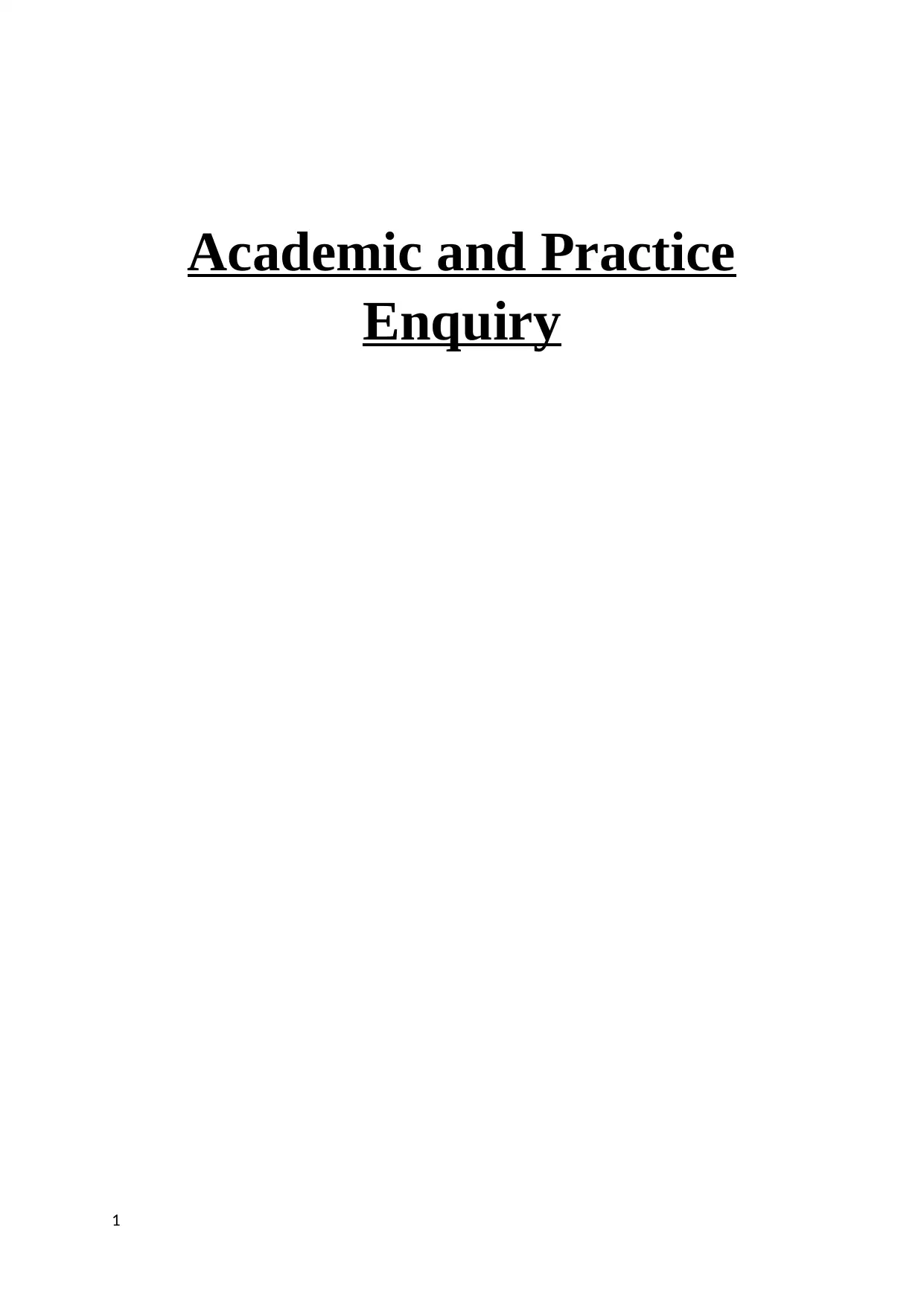
Academic and Practice
Enquiry
1
Enquiry
1
Paraphrase This Document
Need a fresh take? Get an instant paraphrase of this document with our AI Paraphraser
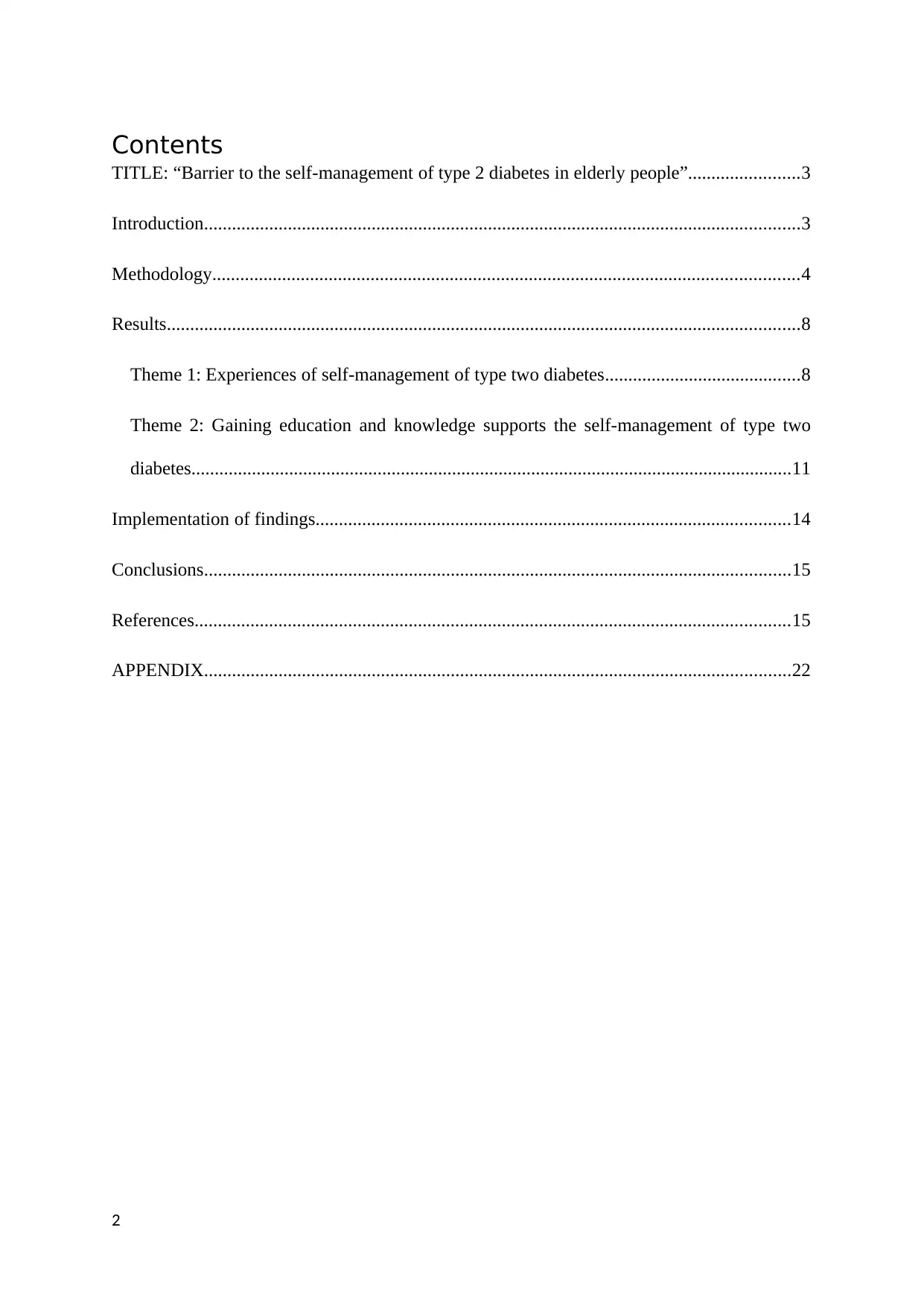
Contents
TITLE: “Barrier to the self-management of type 2 diabetes in elderly people”........................3
Introduction................................................................................................................................3
Methodology..............................................................................................................................4
Results........................................................................................................................................8
Theme 1: Experiences of self-management of type two diabetes..........................................8
Theme 2: Gaining education and knowledge supports the self-management of type two
diabetes.................................................................................................................................11
Implementation of findings......................................................................................................14
Conclusions..............................................................................................................................15
References................................................................................................................................15
APPENDIX..............................................................................................................................22
2
TITLE: “Barrier to the self-management of type 2 diabetes in elderly people”........................3
Introduction................................................................................................................................3
Methodology..............................................................................................................................4
Results........................................................................................................................................8
Theme 1: Experiences of self-management of type two diabetes..........................................8
Theme 2: Gaining education and knowledge supports the self-management of type two
diabetes.................................................................................................................................11
Implementation of findings......................................................................................................14
Conclusions..............................................................................................................................15
References................................................................................................................................15
APPENDIX..............................................................................................................................22
2
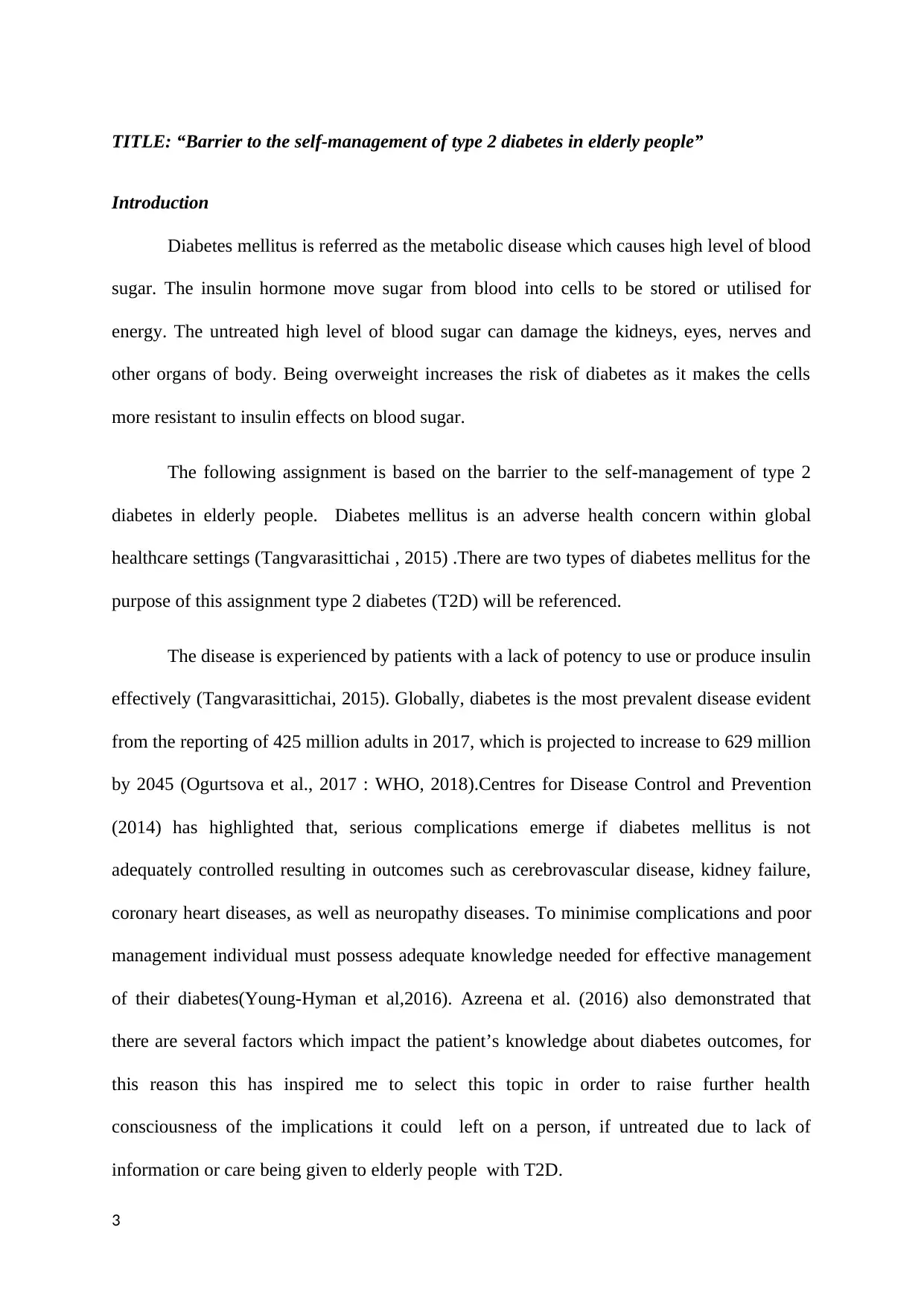
TITLE: “Barrier to the self-management of type 2 diabetes in elderly people”
Introduction
Diabetes mellitus is referred as the metabolic disease which causes high level of blood
sugar. The insulin hormone move sugar from blood into cells to be stored or utilised for
energy. The untreated high level of blood sugar can damage the kidneys, eyes, nerves and
other organs of body. Being overweight increases the risk of diabetes as it makes the cells
more resistant to insulin effects on blood sugar.
The following assignment is based on the barrier to the self-management of type 2
diabetes in elderly people. Diabetes mellitus is an adverse health concern within global
healthcare settings (Tangvarasittichai , 2015) .There are two types of diabetes mellitus for the
purpose of this assignment type 2 diabetes (T2D) will be referenced.
The disease is experienced by patients with a lack of potency to use or produce insulin
effectively (Tangvarasittichai, 2015). Globally, diabetes is the most prevalent disease evident
from the reporting of 425 million adults in 2017, which is projected to increase to 629 million
by 2045 (Ogurtsova et al., 2017 : WHO, 2018).Centres for Disease Control and Prevention
(2014) has highlighted that, serious complications emerge if diabetes mellitus is not
adequately controlled resulting in outcomes such as cerebrovascular disease, kidney failure,
coronary heart diseases, as well as neuropathy diseases. To minimise complications and poor
management individual must possess adequate knowledge needed for effective management
of their diabetes(Young-Hyman et al,2016). Azreena et al. (2016) also demonstrated that
there are several factors which impact the patient’s knowledge about diabetes outcomes, for
this reason this has inspired me to select this topic in order to raise further health
consciousness of the implications it could left on a person, if untreated due to lack of
information or care being given to elderly people with T2D.
3
Introduction
Diabetes mellitus is referred as the metabolic disease which causes high level of blood
sugar. The insulin hormone move sugar from blood into cells to be stored or utilised for
energy. The untreated high level of blood sugar can damage the kidneys, eyes, nerves and
other organs of body. Being overweight increases the risk of diabetes as it makes the cells
more resistant to insulin effects on blood sugar.
The following assignment is based on the barrier to the self-management of type 2
diabetes in elderly people. Diabetes mellitus is an adverse health concern within global
healthcare settings (Tangvarasittichai , 2015) .There are two types of diabetes mellitus for the
purpose of this assignment type 2 diabetes (T2D) will be referenced.
The disease is experienced by patients with a lack of potency to use or produce insulin
effectively (Tangvarasittichai, 2015). Globally, diabetes is the most prevalent disease evident
from the reporting of 425 million adults in 2017, which is projected to increase to 629 million
by 2045 (Ogurtsova et al., 2017 : WHO, 2018).Centres for Disease Control and Prevention
(2014) has highlighted that, serious complications emerge if diabetes mellitus is not
adequately controlled resulting in outcomes such as cerebrovascular disease, kidney failure,
coronary heart diseases, as well as neuropathy diseases. To minimise complications and poor
management individual must possess adequate knowledge needed for effective management
of their diabetes(Young-Hyman et al,2016). Azreena et al. (2016) also demonstrated that
there are several factors which impact the patient’s knowledge about diabetes outcomes, for
this reason this has inspired me to select this topic in order to raise further health
consciousness of the implications it could left on a person, if untreated due to lack of
information or care being given to elderly people with T2D.
3
⊘ This is a preview!⊘
Do you want full access?
Subscribe today to unlock all pages.

Trusted by 1+ million students worldwide
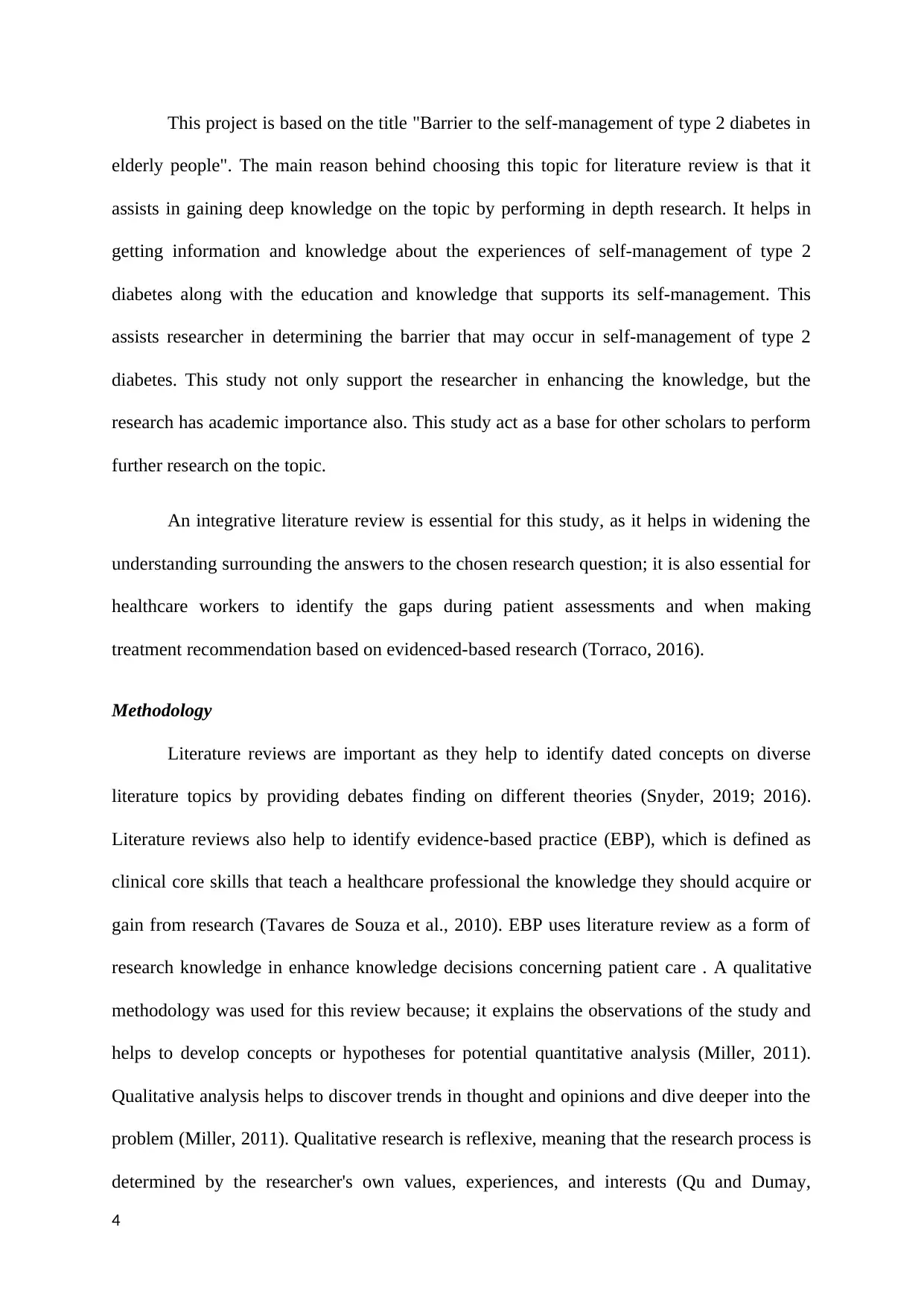
This project is based on the title "Barrier to the self-management of type 2 diabetes in
elderly people". The main reason behind choosing this topic for literature review is that it
assists in gaining deep knowledge on the topic by performing in depth research. It helps in
getting information and knowledge about the experiences of self-management of type 2
diabetes along with the education and knowledge that supports its self-management. This
assists researcher in determining the barrier that may occur in self-management of type 2
diabetes. This study not only support the researcher in enhancing the knowledge, but the
research has academic importance also. This study act as a base for other scholars to perform
further research on the topic.
An integrative literature review is essential for this study, as it helps in widening the
understanding surrounding the answers to the chosen research question; it is also essential for
healthcare workers to identify the gaps during patient assessments and when making
treatment recommendation based on evidenced-based research (Torraco, 2016).
Methodology
Literature reviews are important as they help to identify dated concepts on diverse
literature topics by providing debates finding on different theories (Snyder, 2019; 2016).
Literature reviews also help to identify evidence-based practice (EBP), which is defined as
clinical core skills that teach a healthcare professional the knowledge they should acquire or
gain from research (Tavares de Souza et al., 2010). EBP uses literature review as a form of
research knowledge in enhance knowledge decisions concerning patient care . A qualitative
methodology was used for this review because; it explains the observations of the study and
helps to develop concepts or hypotheses for potential quantitative analysis (Miller, 2011).
Qualitative analysis helps to discover trends in thought and opinions and dive deeper into the
problem (Miller, 2011). Qualitative research is reflexive, meaning that the research process is
determined by the researcher's own values, experiences, and interests (Qu and Dumay,
4
elderly people". The main reason behind choosing this topic for literature review is that it
assists in gaining deep knowledge on the topic by performing in depth research. It helps in
getting information and knowledge about the experiences of self-management of type 2
diabetes along with the education and knowledge that supports its self-management. This
assists researcher in determining the barrier that may occur in self-management of type 2
diabetes. This study not only support the researcher in enhancing the knowledge, but the
research has academic importance also. This study act as a base for other scholars to perform
further research on the topic.
An integrative literature review is essential for this study, as it helps in widening the
understanding surrounding the answers to the chosen research question; it is also essential for
healthcare workers to identify the gaps during patient assessments and when making
treatment recommendation based on evidenced-based research (Torraco, 2016).
Methodology
Literature reviews are important as they help to identify dated concepts on diverse
literature topics by providing debates finding on different theories (Snyder, 2019; 2016).
Literature reviews also help to identify evidence-based practice (EBP), which is defined as
clinical core skills that teach a healthcare professional the knowledge they should acquire or
gain from research (Tavares de Souza et al., 2010). EBP uses literature review as a form of
research knowledge in enhance knowledge decisions concerning patient care . A qualitative
methodology was used for this review because; it explains the observations of the study and
helps to develop concepts or hypotheses for potential quantitative analysis (Miller, 2011).
Qualitative analysis helps to discover trends in thought and opinions and dive deeper into the
problem (Miller, 2011). Qualitative research is reflexive, meaning that the research process is
determined by the researcher's own values, experiences, and interests (Qu and Dumay,
4
Paraphrase This Document
Need a fresh take? Get an instant paraphrase of this document with our AI Paraphraser
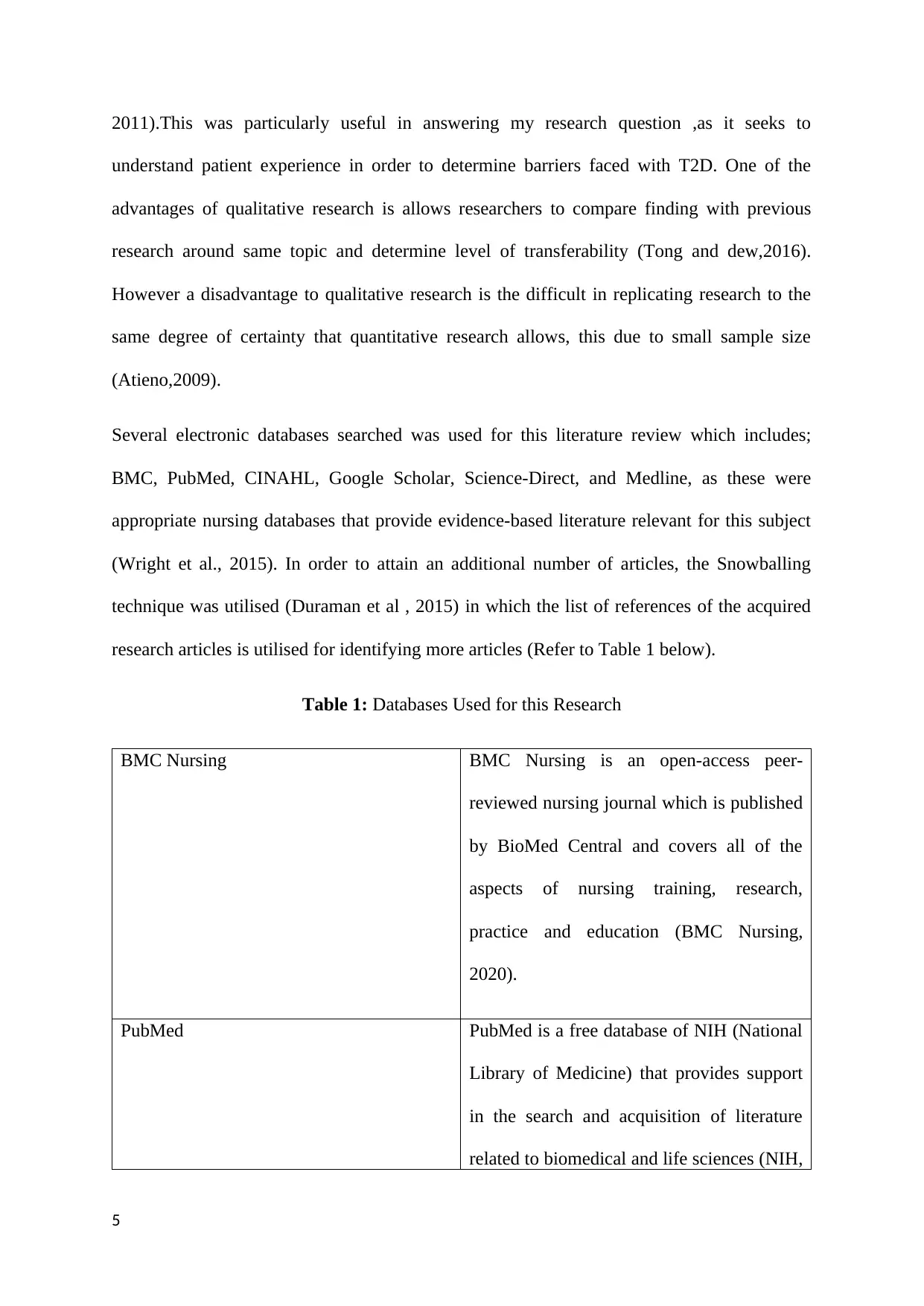
2011).This was particularly useful in answering my research question ,as it seeks to
understand patient experience in order to determine barriers faced with T2D. One of the
advantages of qualitative research is allows researchers to compare finding with previous
research around same topic and determine level of transferability (Tong and dew,2016).
However a disadvantage to qualitative research is the difficult in replicating research to the
same degree of certainty that quantitative research allows, this due to small sample size
(Atieno,2009).
Several electronic databases searched was used for this literature review which includes;
BMC, PubMed, CINAHL, Google Scholar, Science-Direct, and Medline, as these were
appropriate nursing databases that provide evidence-based literature relevant for this subject
(Wright et al., 2015). In order to attain an additional number of articles, the Snowballing
technique was utilised (Duraman et al , 2015) in which the list of references of the acquired
research articles is utilised for identifying more articles (Refer to Table 1 below).
Table 1: Databases Used for this Research
BMC Nursing BMC Nursing is an open-access peer-
reviewed nursing journal which is published
by BioMed Central and covers all of the
aspects of nursing training, research,
practice and education (BMC Nursing,
2020).
PubMed PubMed is a free database of NIH (National
Library of Medicine) that provides support
in the search and acquisition of literature
related to biomedical and life sciences (NIH,
5
understand patient experience in order to determine barriers faced with T2D. One of the
advantages of qualitative research is allows researchers to compare finding with previous
research around same topic and determine level of transferability (Tong and dew,2016).
However a disadvantage to qualitative research is the difficult in replicating research to the
same degree of certainty that quantitative research allows, this due to small sample size
(Atieno,2009).
Several electronic databases searched was used for this literature review which includes;
BMC, PubMed, CINAHL, Google Scholar, Science-Direct, and Medline, as these were
appropriate nursing databases that provide evidence-based literature relevant for this subject
(Wright et al., 2015). In order to attain an additional number of articles, the Snowballing
technique was utilised (Duraman et al , 2015) in which the list of references of the acquired
research articles is utilised for identifying more articles (Refer to Table 1 below).
Table 1: Databases Used for this Research
BMC Nursing BMC Nursing is an open-access peer-
reviewed nursing journal which is published
by BioMed Central and covers all of the
aspects of nursing training, research,
practice and education (BMC Nursing,
2020).
PubMed PubMed is a free database of NIH (National
Library of Medicine) that provides support
in the search and acquisition of literature
related to biomedical and life sciences (NIH,
5
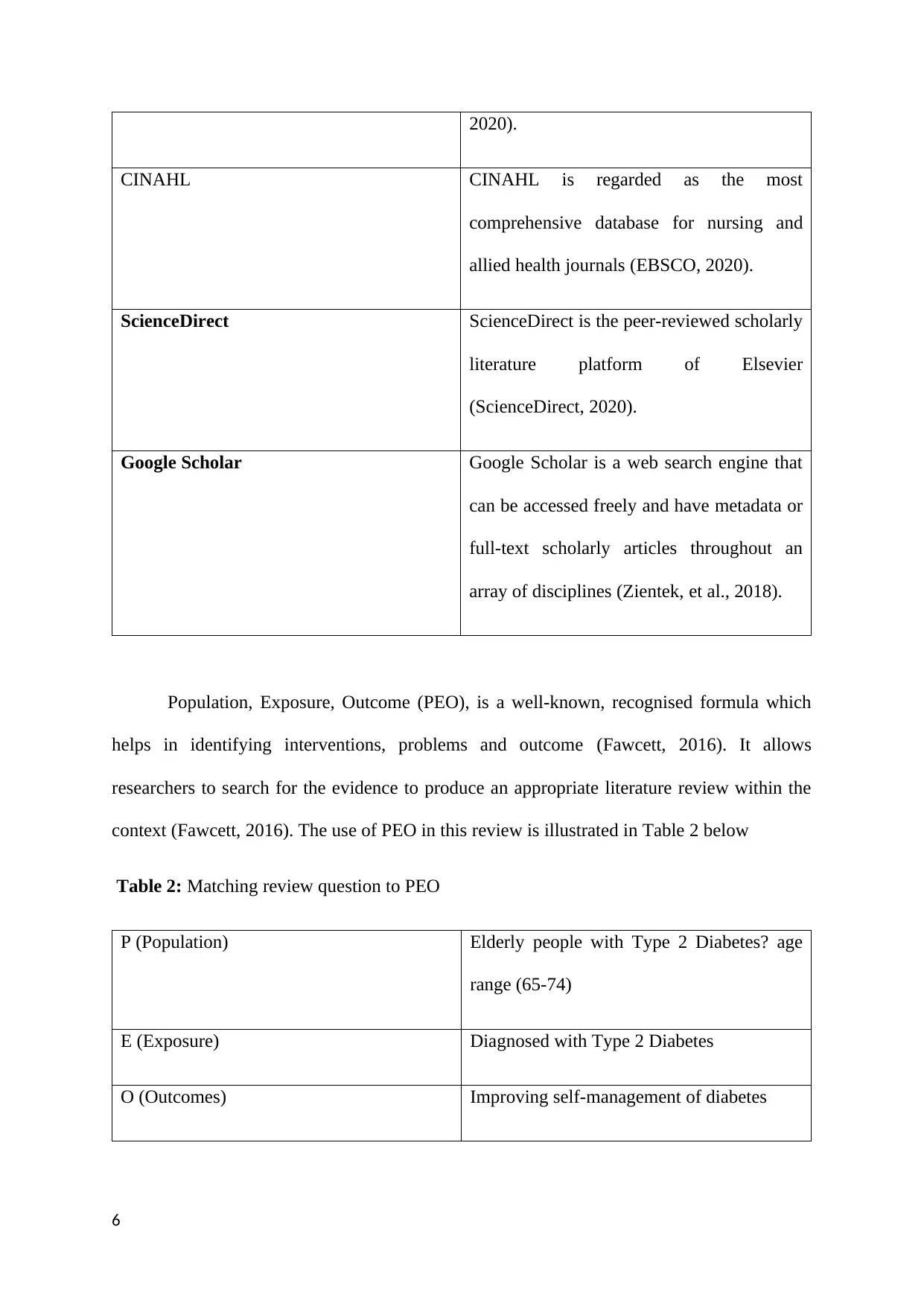
2020).
CINAHL CINAHL is regarded as the most
comprehensive database for nursing and
allied health journals (EBSCO, 2020).
ScienceDirect ScienceDirect is the peer-reviewed scholarly
literature platform of Elsevier
(ScienceDirect, 2020).
Google Scholar Google Scholar is a web search engine that
can be accessed freely and have metadata or
full-text scholarly articles throughout an
array of disciplines (Zientek, et al., 2018).
Population, Exposure, Outcome (PEO), is a well-known, recognised formula which
helps in identifying interventions, problems and outcome (Fawcett, 2016). It allows
researchers to search for the evidence to produce an appropriate literature review within the
context (Fawcett, 2016). The use of PEO in this review is illustrated in Table 2 below
Table 2: Matching review question to PEO
P (Population) Elderly people with Type 2 Diabetes? age
range (65-74)
E (Exposure) Diagnosed with Type 2 Diabetes
O (Outcomes) Improving self-management of diabetes
6
CINAHL CINAHL is regarded as the most
comprehensive database for nursing and
allied health journals (EBSCO, 2020).
ScienceDirect ScienceDirect is the peer-reviewed scholarly
literature platform of Elsevier
(ScienceDirect, 2020).
Google Scholar Google Scholar is a web search engine that
can be accessed freely and have metadata or
full-text scholarly articles throughout an
array of disciplines (Zientek, et al., 2018).
Population, Exposure, Outcome (PEO), is a well-known, recognised formula which
helps in identifying interventions, problems and outcome (Fawcett, 2016). It allows
researchers to search for the evidence to produce an appropriate literature review within the
context (Fawcett, 2016). The use of PEO in this review is illustrated in Table 2 below
Table 2: Matching review question to PEO
P (Population) Elderly people with Type 2 Diabetes? age
range (65-74)
E (Exposure) Diagnosed with Type 2 Diabetes
O (Outcomes) Improving self-management of diabetes
6
⊘ This is a preview!⊘
Do you want full access?
Subscribe today to unlock all pages.

Trusted by 1+ million students worldwide
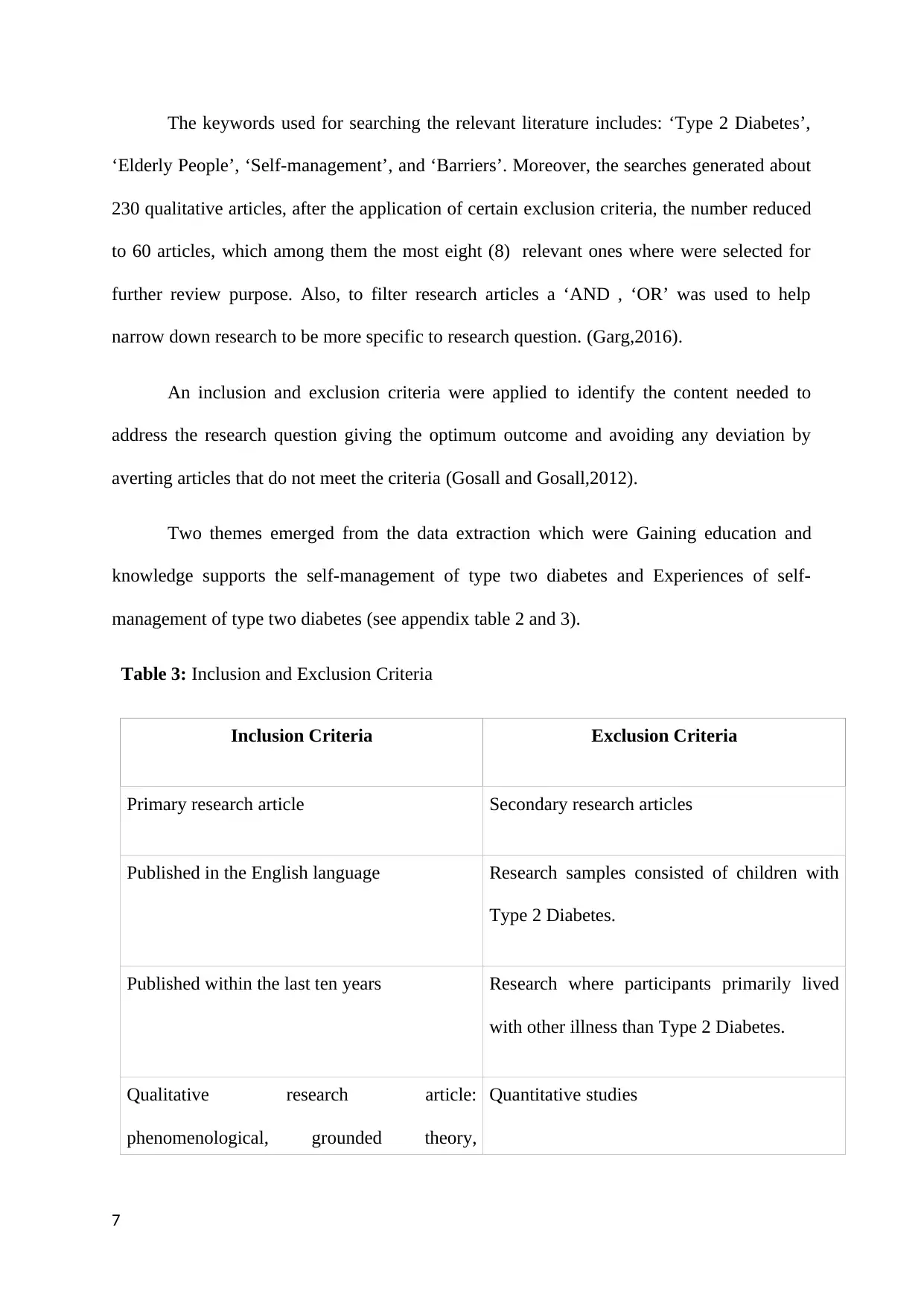
The keywords used for searching the relevant literature includes: ‘Type 2 Diabetes’,
‘Elderly People’, ‘Self-management’, and ‘Barriers’. Moreover, the searches generated about
230 qualitative articles, after the application of certain exclusion criteria, the number reduced
to 60 articles, which among them the most eight (8) relevant ones where were selected for
further review purpose. Also, to filter research articles a ‘AND , ‘OR’ was used to help
narrow down research to be more specific to research question. (Garg,2016).
An inclusion and exclusion criteria were applied to identify the content needed to
address the research question giving the optimum outcome and avoiding any deviation by
averting articles that do not meet the criteria (Gosall and Gosall,2012).
Two themes emerged from the data extraction which were Gaining education and
knowledge supports the self-management of type two diabetes and Experiences of self-
management of type two diabetes (see appendix table 2 and 3).
Table 3: Inclusion and Exclusion Criteria
Inclusion Criteria Exclusion Criteria
Primary research article Secondary research articles
Published in the English language Research samples consisted of children with
Type 2 Diabetes.
Published within the last ten years Research where participants primarily lived
with other illness than Type 2 Diabetes.
Qualitative research article:
phenomenological, grounded theory,
Quantitative studies
7
‘Elderly People’, ‘Self-management’, and ‘Barriers’. Moreover, the searches generated about
230 qualitative articles, after the application of certain exclusion criteria, the number reduced
to 60 articles, which among them the most eight (8) relevant ones where were selected for
further review purpose. Also, to filter research articles a ‘AND , ‘OR’ was used to help
narrow down research to be more specific to research question. (Garg,2016).
An inclusion and exclusion criteria were applied to identify the content needed to
address the research question giving the optimum outcome and avoiding any deviation by
averting articles that do not meet the criteria (Gosall and Gosall,2012).
Two themes emerged from the data extraction which were Gaining education and
knowledge supports the self-management of type two diabetes and Experiences of self-
management of type two diabetes (see appendix table 2 and 3).
Table 3: Inclusion and Exclusion Criteria
Inclusion Criteria Exclusion Criteria
Primary research article Secondary research articles
Published in the English language Research samples consisted of children with
Type 2 Diabetes.
Published within the last ten years Research where participants primarily lived
with other illness than Type 2 Diabetes.
Qualitative research article:
phenomenological, grounded theory,
Quantitative studies
7
Paraphrase This Document
Need a fresh take? Get an instant paraphrase of this document with our AI Paraphraser
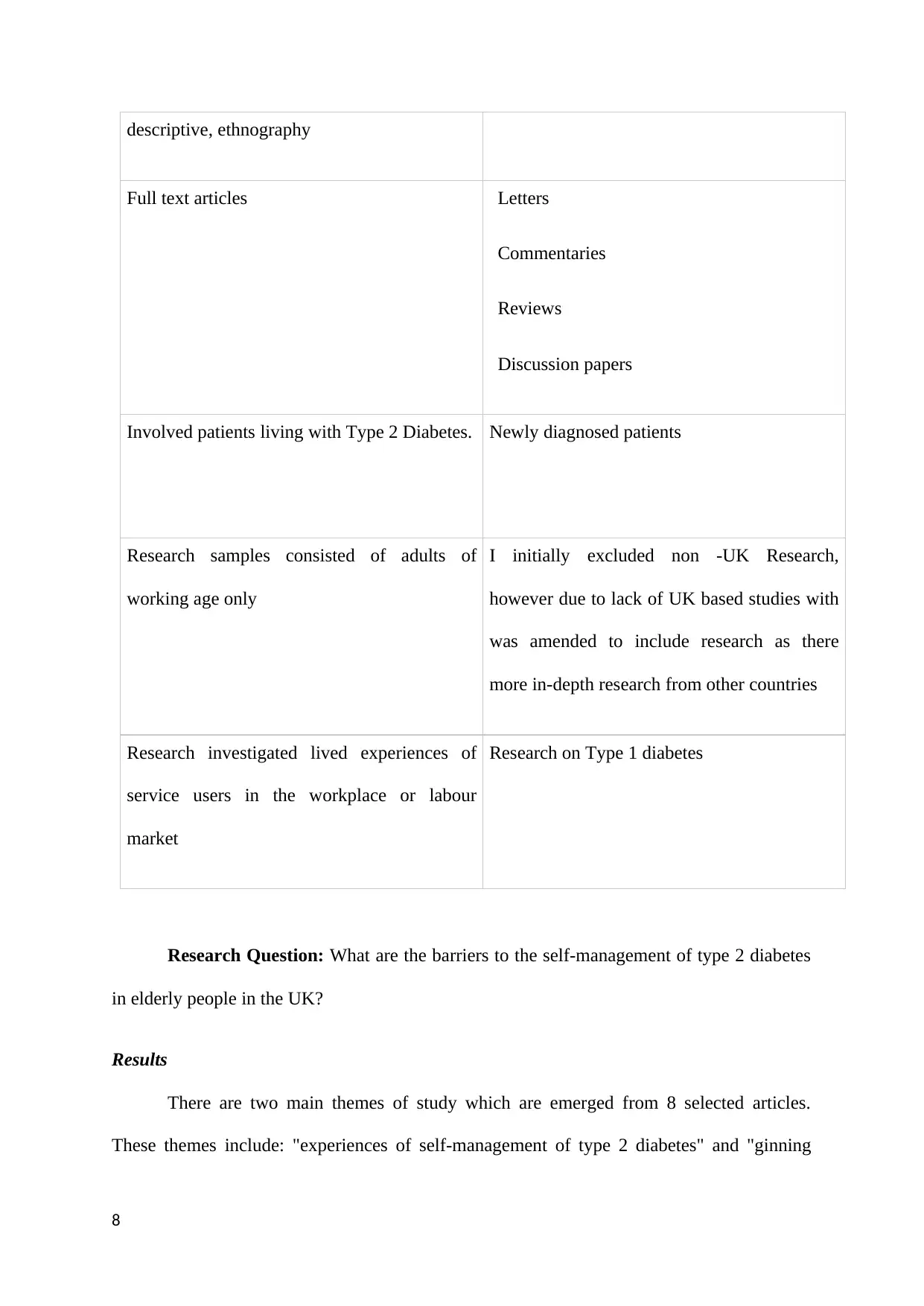
descriptive, ethnography
Full text articles Letters
Commentaries
Reviews
Discussion papers
Involved patients living with Type 2 Diabetes. Newly diagnosed patients
Research samples consisted of adults of
working age only
I initially excluded non -UK Research,
however due to lack of UK based studies with
was amended to include research as there
more in-depth research from other countries
Research investigated lived experiences of
service users in the workplace or labour
market
Research on Type 1 diabetes
Research Question: What are the barriers to the self-management of type 2 diabetes
in elderly people in the UK?
Results
There are two main themes of study which are emerged from 8 selected articles.
These themes include: "experiences of self-management of type 2 diabetes" and "ginning
8
Full text articles Letters
Commentaries
Reviews
Discussion papers
Involved patients living with Type 2 Diabetes. Newly diagnosed patients
Research samples consisted of adults of
working age only
I initially excluded non -UK Research,
however due to lack of UK based studies with
was amended to include research as there
more in-depth research from other countries
Research investigated lived experiences of
service users in the workplace or labour
market
Research on Type 1 diabetes
Research Question: What are the barriers to the self-management of type 2 diabetes
in elderly people in the UK?
Results
There are two main themes of study which are emerged from 8 selected articles.
These themes include: "experiences of self-management of type 2 diabetes" and "ginning
8
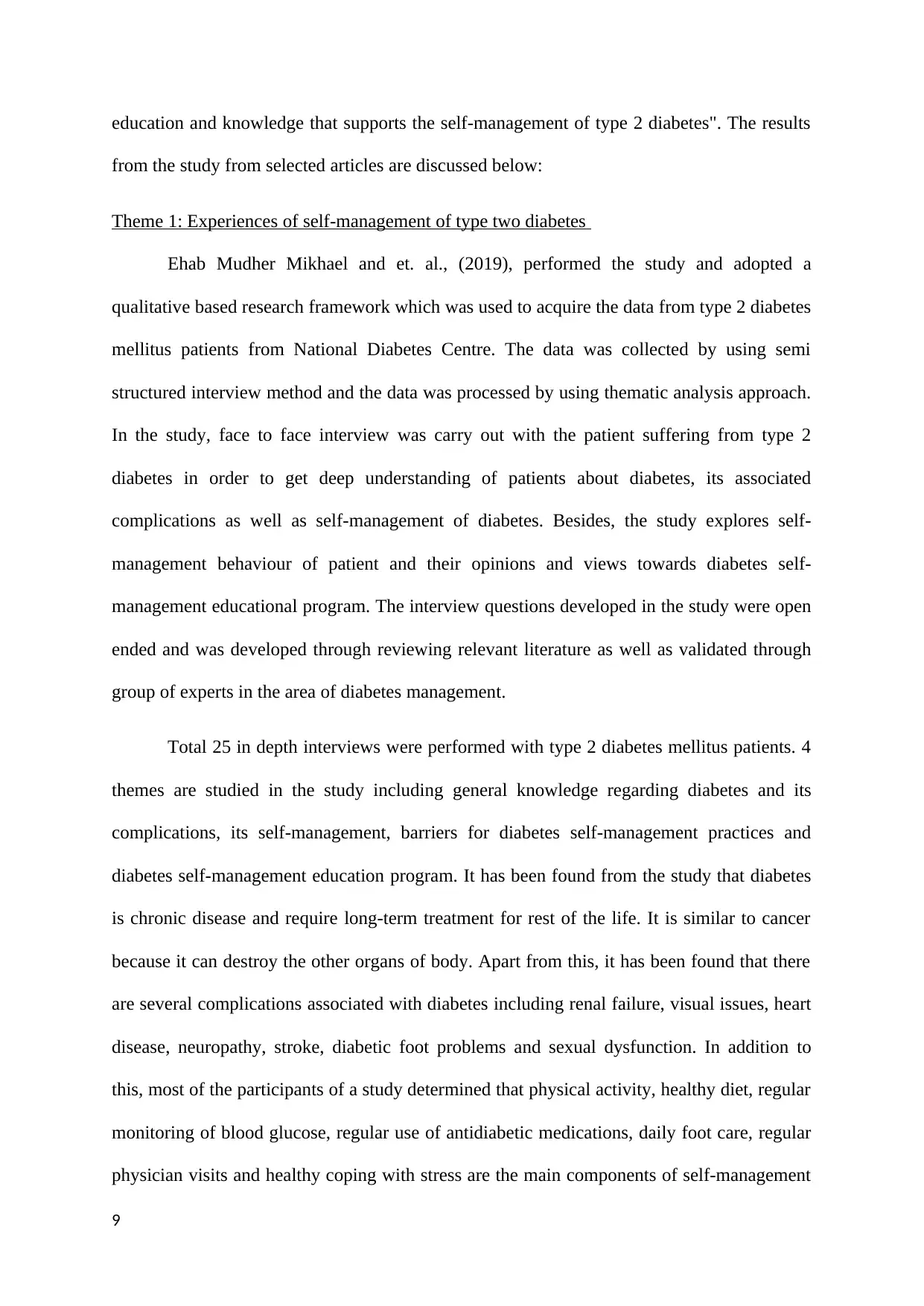
education and knowledge that supports the self-management of type 2 diabetes". The results
from the study from selected articles are discussed below:
Theme 1: Experiences of self-management of type two diabetes
Ehab Mudher Mikhael and et. al., (2019), performed the study and adopted a
qualitative based research framework which was used to acquire the data from type 2 diabetes
mellitus patients from National Diabetes Centre. The data was collected by using semi
structured interview method and the data was processed by using thematic analysis approach.
In the study, face to face interview was carry out with the patient suffering from type 2
diabetes in order to get deep understanding of patients about diabetes, its associated
complications as well as self-management of diabetes. Besides, the study explores self-
management behaviour of patient and their opinions and views towards diabetes self-
management educational program. The interview questions developed in the study were open
ended and was developed through reviewing relevant literature as well as validated through
group of experts in the area of diabetes management.
Total 25 in depth interviews were performed with type 2 diabetes mellitus patients. 4
themes are studied in the study including general knowledge regarding diabetes and its
complications, its self-management, barriers for diabetes self-management practices and
diabetes self-management education program. It has been found from the study that diabetes
is chronic disease and require long-term treatment for rest of the life. It is similar to cancer
because it can destroy the other organs of body. Apart from this, it has been found that there
are several complications associated with diabetes including renal failure, visual issues, heart
disease, neuropathy, stroke, diabetic foot problems and sexual dysfunction. In addition to
this, most of the participants of a study determined that physical activity, healthy diet, regular
monitoring of blood glucose, regular use of antidiabetic medications, daily foot care, regular
physician visits and healthy coping with stress are the main components of self-management
9
from the study from selected articles are discussed below:
Theme 1: Experiences of self-management of type two diabetes
Ehab Mudher Mikhael and et. al., (2019), performed the study and adopted a
qualitative based research framework which was used to acquire the data from type 2 diabetes
mellitus patients from National Diabetes Centre. The data was collected by using semi
structured interview method and the data was processed by using thematic analysis approach.
In the study, face to face interview was carry out with the patient suffering from type 2
diabetes in order to get deep understanding of patients about diabetes, its associated
complications as well as self-management of diabetes. Besides, the study explores self-
management behaviour of patient and their opinions and views towards diabetes self-
management educational program. The interview questions developed in the study were open
ended and was developed through reviewing relevant literature as well as validated through
group of experts in the area of diabetes management.
Total 25 in depth interviews were performed with type 2 diabetes mellitus patients. 4
themes are studied in the study including general knowledge regarding diabetes and its
complications, its self-management, barriers for diabetes self-management practices and
diabetes self-management education program. It has been found from the study that diabetes
is chronic disease and require long-term treatment for rest of the life. It is similar to cancer
because it can destroy the other organs of body. Apart from this, it has been found that there
are several complications associated with diabetes including renal failure, visual issues, heart
disease, neuropathy, stroke, diabetic foot problems and sexual dysfunction. In addition to
this, most of the participants of a study determined that physical activity, healthy diet, regular
monitoring of blood glucose, regular use of antidiabetic medications, daily foot care, regular
physician visits and healthy coping with stress are the main components of self-management
9
⊘ This is a preview!⊘
Do you want full access?
Subscribe today to unlock all pages.

Trusted by 1+ million students worldwide
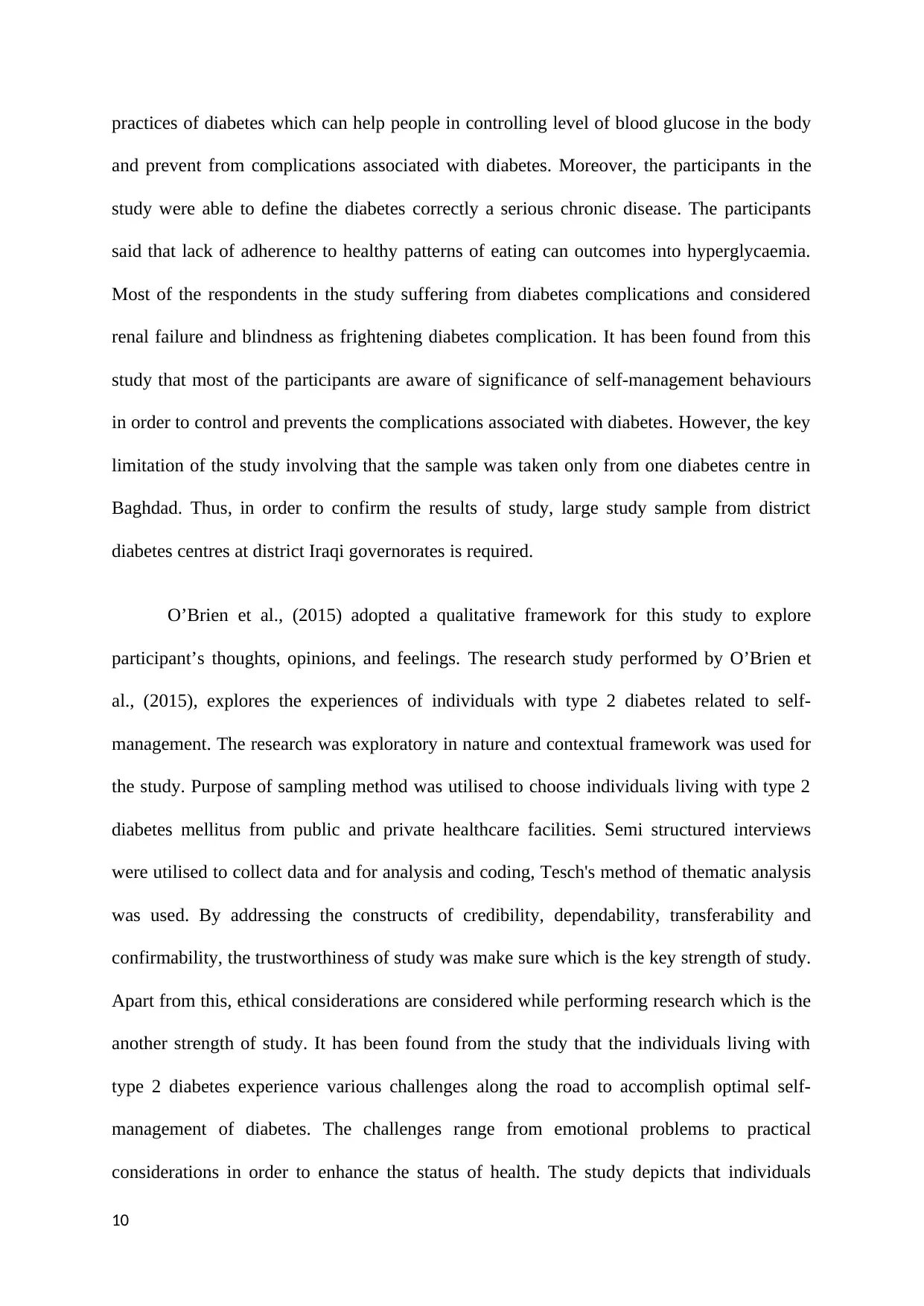
practices of diabetes which can help people in controlling level of blood glucose in the body
and prevent from complications associated with diabetes. Moreover, the participants in the
study were able to define the diabetes correctly a serious chronic disease. The participants
said that lack of adherence to healthy patterns of eating can outcomes into hyperglycaemia.
Most of the respondents in the study suffering from diabetes complications and considered
renal failure and blindness as frightening diabetes complication. It has been found from this
study that most of the participants are aware of significance of self-management behaviours
in order to control and prevents the complications associated with diabetes. However, the key
limitation of the study involving that the sample was taken only from one diabetes centre in
Baghdad. Thus, in order to confirm the results of study, large study sample from district
diabetes centres at district Iraqi governorates is required.
O’Brien et al., (2015) adopted a qualitative framework for this study to explore
participant’s thoughts, opinions, and feelings. The research study performed by O’Brien et
al., (2015), explores the experiences of individuals with type 2 diabetes related to self-
management. The research was exploratory in nature and contextual framework was used for
the study. Purpose of sampling method was utilised to choose individuals living with type 2
diabetes mellitus from public and private healthcare facilities. Semi structured interviews
were utilised to collect data and for analysis and coding, Tesch's method of thematic analysis
was used. By addressing the constructs of credibility, dependability, transferability and
confirmability, the trustworthiness of study was make sure which is the key strength of study.
Apart from this, ethical considerations are considered while performing research which is the
another strength of study. It has been found from the study that the individuals living with
type 2 diabetes experience various challenges along the road to accomplish optimal self-
management of diabetes. The challenges range from emotional problems to practical
considerations in order to enhance the status of health. The study depicts that individuals
10
and prevent from complications associated with diabetes. Moreover, the participants in the
study were able to define the diabetes correctly a serious chronic disease. The participants
said that lack of adherence to healthy patterns of eating can outcomes into hyperglycaemia.
Most of the respondents in the study suffering from diabetes complications and considered
renal failure and blindness as frightening diabetes complication. It has been found from this
study that most of the participants are aware of significance of self-management behaviours
in order to control and prevents the complications associated with diabetes. However, the key
limitation of the study involving that the sample was taken only from one diabetes centre in
Baghdad. Thus, in order to confirm the results of study, large study sample from district
diabetes centres at district Iraqi governorates is required.
O’Brien et al., (2015) adopted a qualitative framework for this study to explore
participant’s thoughts, opinions, and feelings. The research study performed by O’Brien et
al., (2015), explores the experiences of individuals with type 2 diabetes related to self-
management. The research was exploratory in nature and contextual framework was used for
the study. Purpose of sampling method was utilised to choose individuals living with type 2
diabetes mellitus from public and private healthcare facilities. Semi structured interviews
were utilised to collect data and for analysis and coding, Tesch's method of thematic analysis
was used. By addressing the constructs of credibility, dependability, transferability and
confirmability, the trustworthiness of study was make sure which is the key strength of study.
Apart from this, ethical considerations are considered while performing research which is the
another strength of study. It has been found from the study that the individuals living with
type 2 diabetes experience various challenges along the road to accomplish optimal self-
management of diabetes. The challenges range from emotional problems to practical
considerations in order to enhance the status of health. The study depicts that individuals
10
Paraphrase This Document
Need a fresh take? Get an instant paraphrase of this document with our AI Paraphraser
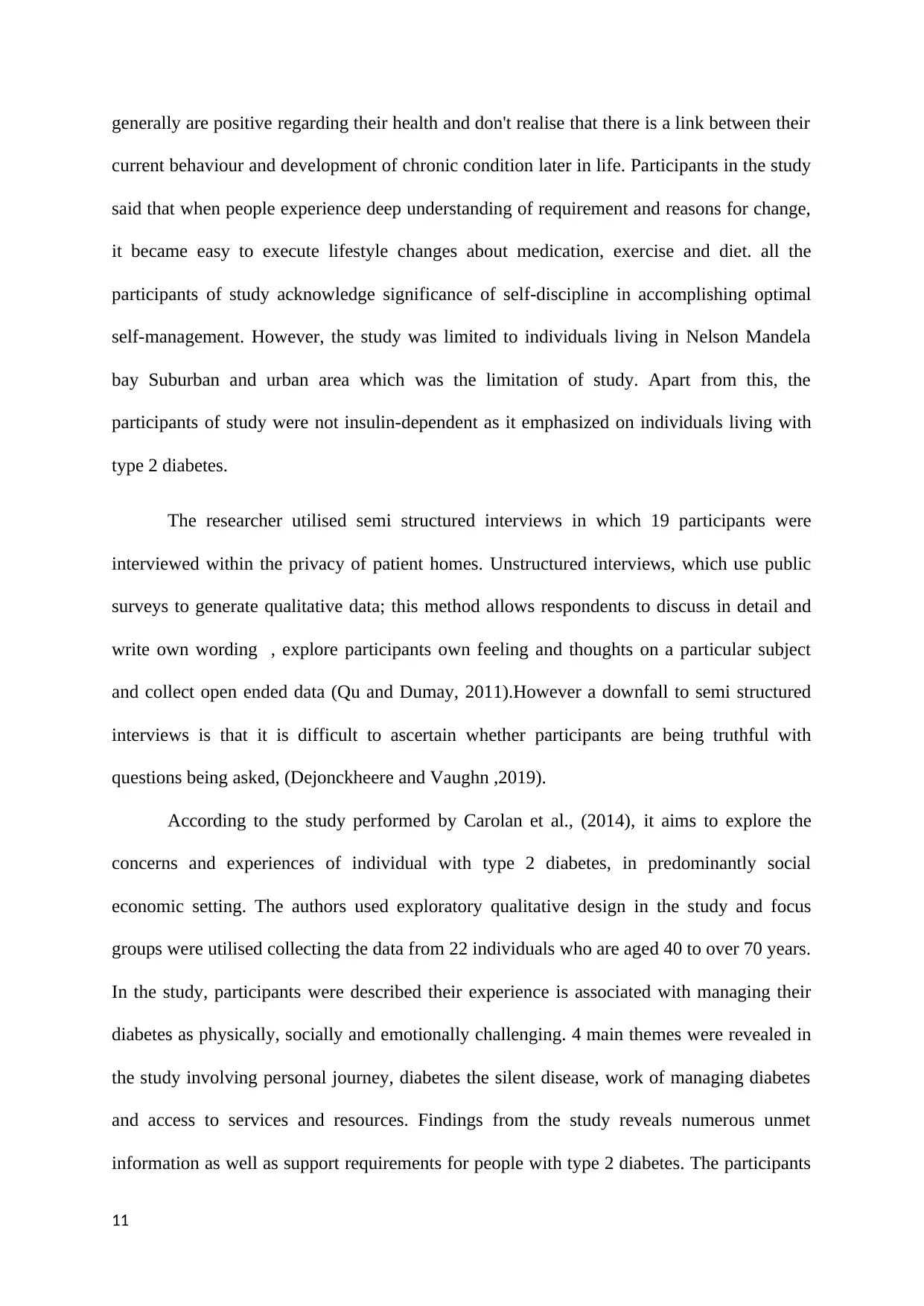
generally are positive regarding their health and don't realise that there is a link between their
current behaviour and development of chronic condition later in life. Participants in the study
said that when people experience deep understanding of requirement and reasons for change,
it became easy to execute lifestyle changes about medication, exercise and diet. all the
participants of study acknowledge significance of self-discipline in accomplishing optimal
self-management. However, the study was limited to individuals living in Nelson Mandela
bay Suburban and urban area which was the limitation of study. Apart from this, the
participants of study were not insulin-dependent as it emphasized on individuals living with
type 2 diabetes.
The researcher utilised semi structured interviews in which 19 participants were
interviewed within the privacy of patient homes. Unstructured interviews, which use public
surveys to generate qualitative data; this method allows respondents to discuss in detail and
write own wording , explore participants own feeling and thoughts on a particular subject
and collect open ended data (Qu and Dumay, 2011).However a downfall to semi structured
interviews is that it is difficult to ascertain whether participants are being truthful with
questions being asked, (Dejonckheere and Vaughn ,2019).
According to the study performed by Carolan et al., (2014), it aims to explore the
concerns and experiences of individual with type 2 diabetes, in predominantly social
economic setting. The authors used exploratory qualitative design in the study and focus
groups were utilised collecting the data from 22 individuals who are aged 40 to over 70 years.
In the study, participants were described their experience is associated with managing their
diabetes as physically, socially and emotionally challenging. 4 main themes were revealed in
the study involving personal journey, diabetes the silent disease, work of managing diabetes
and access to services and resources. Findings from the study reveals numerous unmet
information as well as support requirements for people with type 2 diabetes. The participants
11
current behaviour and development of chronic condition later in life. Participants in the study
said that when people experience deep understanding of requirement and reasons for change,
it became easy to execute lifestyle changes about medication, exercise and diet. all the
participants of study acknowledge significance of self-discipline in accomplishing optimal
self-management. However, the study was limited to individuals living in Nelson Mandela
bay Suburban and urban area which was the limitation of study. Apart from this, the
participants of study were not insulin-dependent as it emphasized on individuals living with
type 2 diabetes.
The researcher utilised semi structured interviews in which 19 participants were
interviewed within the privacy of patient homes. Unstructured interviews, which use public
surveys to generate qualitative data; this method allows respondents to discuss in detail and
write own wording , explore participants own feeling and thoughts on a particular subject
and collect open ended data (Qu and Dumay, 2011).However a downfall to semi structured
interviews is that it is difficult to ascertain whether participants are being truthful with
questions being asked, (Dejonckheere and Vaughn ,2019).
According to the study performed by Carolan et al., (2014), it aims to explore the
concerns and experiences of individual with type 2 diabetes, in predominantly social
economic setting. The authors used exploratory qualitative design in the study and focus
groups were utilised collecting the data from 22 individuals who are aged 40 to over 70 years.
In the study, participants were described their experience is associated with managing their
diabetes as physically, socially and emotionally challenging. 4 main themes were revealed in
the study involving personal journey, diabetes the silent disease, work of managing diabetes
and access to services and resources. Findings from the study reveals numerous unmet
information as well as support requirements for people with type 2 diabetes. The participants
11
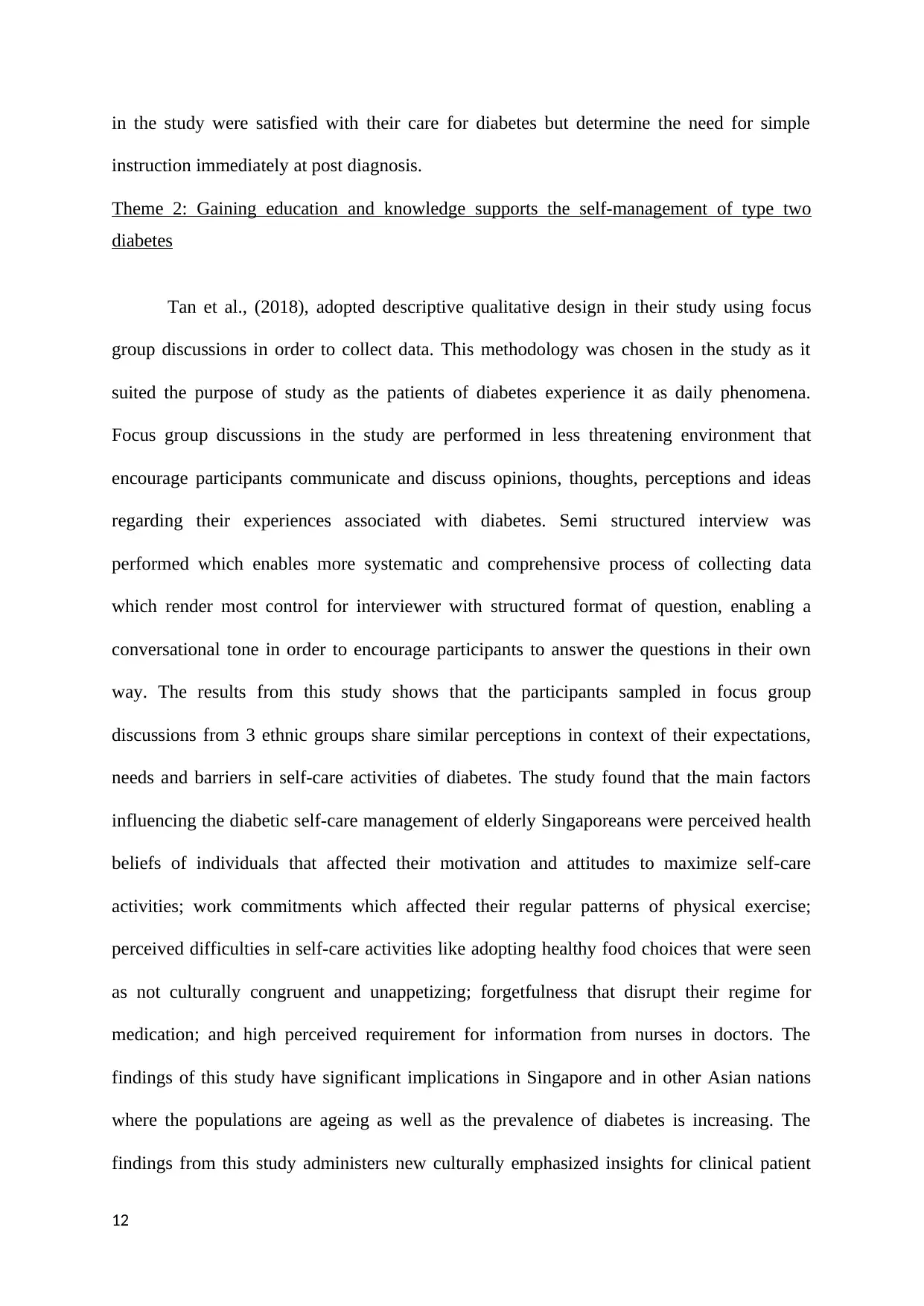
in the study were satisfied with their care for diabetes but determine the need for simple
instruction immediately at post diagnosis.
Theme 2: Gaining education and knowledge supports the self-management of type two
diabetes
Tan et al., (2018), adopted descriptive qualitative design in their study using focus
group discussions in order to collect data. This methodology was chosen in the study as it
suited the purpose of study as the patients of diabetes experience it as daily phenomena.
Focus group discussions in the study are performed in less threatening environment that
encourage participants communicate and discuss opinions, thoughts, perceptions and ideas
regarding their experiences associated with diabetes. Semi structured interview was
performed which enables more systematic and comprehensive process of collecting data
which render most control for interviewer with structured format of question, enabling a
conversational tone in order to encourage participants to answer the questions in their own
way. The results from this study shows that the participants sampled in focus group
discussions from 3 ethnic groups share similar perceptions in context of their expectations,
needs and barriers in self-care activities of diabetes. The study found that the main factors
influencing the diabetic self-care management of elderly Singaporeans were perceived health
beliefs of individuals that affected their motivation and attitudes to maximize self-care
activities; work commitments which affected their regular patterns of physical exercise;
perceived difficulties in self-care activities like adopting healthy food choices that were seen
as not culturally congruent and unappetizing; forgetfulness that disrupt their regime for
medication; and high perceived requirement for information from nurses in doctors. The
findings of this study have significant implications in Singapore and in other Asian nations
where the populations are ageing as well as the prevalence of diabetes is increasing. The
findings from this study administers new culturally emphasized insights for clinical patient
12
instruction immediately at post diagnosis.
Theme 2: Gaining education and knowledge supports the self-management of type two
diabetes
Tan et al., (2018), adopted descriptive qualitative design in their study using focus
group discussions in order to collect data. This methodology was chosen in the study as it
suited the purpose of study as the patients of diabetes experience it as daily phenomena.
Focus group discussions in the study are performed in less threatening environment that
encourage participants communicate and discuss opinions, thoughts, perceptions and ideas
regarding their experiences associated with diabetes. Semi structured interview was
performed which enables more systematic and comprehensive process of collecting data
which render most control for interviewer with structured format of question, enabling a
conversational tone in order to encourage participants to answer the questions in their own
way. The results from this study shows that the participants sampled in focus group
discussions from 3 ethnic groups share similar perceptions in context of their expectations,
needs and barriers in self-care activities of diabetes. The study found that the main factors
influencing the diabetic self-care management of elderly Singaporeans were perceived health
beliefs of individuals that affected their motivation and attitudes to maximize self-care
activities; work commitments which affected their regular patterns of physical exercise;
perceived difficulties in self-care activities like adopting healthy food choices that were seen
as not culturally congruent and unappetizing; forgetfulness that disrupt their regime for
medication; and high perceived requirement for information from nurses in doctors. The
findings of this study have significant implications in Singapore and in other Asian nations
where the populations are ageing as well as the prevalence of diabetes is increasing. The
findings from this study administers new culturally emphasized insights for clinical patient
12
⊘ This is a preview!⊘
Do you want full access?
Subscribe today to unlock all pages.

Trusted by 1+ million students worldwide
1 out of 44
Related Documents
Your All-in-One AI-Powered Toolkit for Academic Success.
+13062052269
info@desklib.com
Available 24*7 on WhatsApp / Email
![[object Object]](/_next/static/media/star-bottom.7253800d.svg)
Unlock your academic potential
Copyright © 2020–2026 A2Z Services. All Rights Reserved. Developed and managed by ZUCOL.





